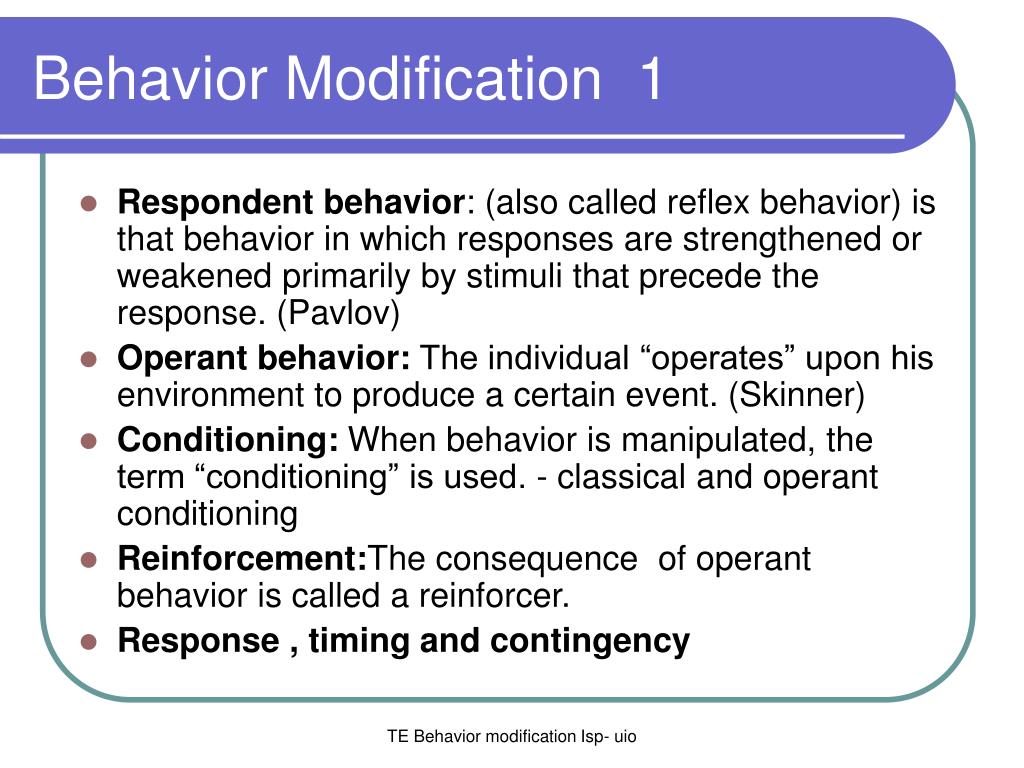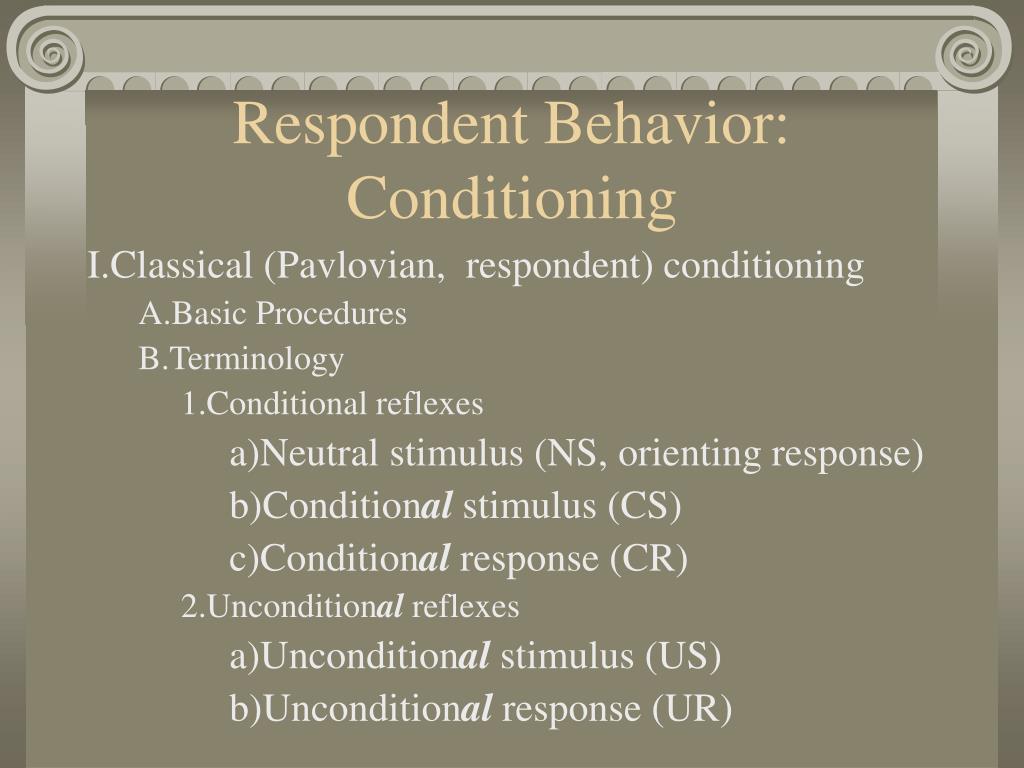, costs related to alternative usage of interview time). Explore examples, related terms, and . Updated on 04/19/2018.Respondent conditioning is a form of learning that occurs when a stimulus that naturally elicits a response (known as an unconditioned stimulus) is paired with a .respondent behavior – tepkisel davranış. Browse Dictionary. Authors: Peter Sturmey. Learn how respondent behavior can affect mental .The distinction between operant and respondent behavior classes has received considerable attention throughout the history of behavior analysis.Schlagwörter:Respondent ConditioningRespondent Behavior Definition Psych To gain a deeper understanding of respondent conditioning, it is essential to explore prominent experiments and distinguish between respondent and operant behaviors.The operant-respondent distinction has provided a major organizing framework for the data generated through the experimental analysis of behavior. This work-in-progress paper introduces the concept of Respondent Behavior Logging (RBL), consisting of static and dynamic models that conceptualize respondent behavior when filling in online questionnaires. In the case of .
RESPONDENT BEHAVIOR
Respondent behavior is a behavioral process (or behavior) that happens in response to some stimuli, and is essential to an organism’s survival. Emotionen mit ihren nuancierten Differenzierun-gen1 erweisen sich als zentrale Determinanten für Verhalten und Handlungen, sei es als situationsspe-zifisch .Respondent conditioning involves the pairing of a neutral stimulus with an unconditioned stimulus to elicit a response. Dogs naturally salivate in response to food, and through stimulus pairing, Pavlov demonstrated that a .Schlagwörter:Respondent ConditioningRespondent Behavior Psychology If the pupil does not flicker, the eye will be more exposed to sun. Baer, Child development, Vol.Als respondentes Verhalten bezeichnet man in der Psychologie ein Verhalten, das als automatische Reaktion auf einen bestimmten Reiz auftritt.Email: [email protected] behavior is the term used to describe behavior which is elicited, or brought about, by preceding stimulus events in the environment (Cooper et al. Respondent (Reflex) Behavior. Some have contended that because operant and respondent processes share a number of similarities, the distinction should be dropped.Schlagwörter:Operant LearningDefine Operant Conditioning PsychLearn what respondent behavior is and how it is classified into different types, such as reflexes, habituation, sensitization, and conditioning.Respondent conditioning has proven to be a valuable tool in shaping behavior and understanding the mechanisms underlying certain psychological processes. Learn about the history, examples, and applications of respondent behavior in the context of autism .
Respondent Behavior
This chapter looks at the analysis of psychological interactions involving respondents, the attachment of respondent behavior to new stimuli, the detachment of respondent .Schlagwörter:Examples of Respondent ConditioningNobel PrizesPennypacker’s Pedants presents:A definition of respondent behavior.Respondent behavior is a type of learning that involves associating stimuli with automatic responses.Respondent behaviors serve an adaptive role for the organism by regulating its physiology or otherwise contributing to the safety of the organism and survival of its .

Respondent Behavior
That is, respondent conditioning involves involuntary responses, while operant conditioning involves voluntary behavior.

Opinion
One of the best-known examples of classical conditioning is Pavlov’s classic experiments with dogs. Through operant conditioning, an .The dichotomy of behavior: Understanding respondent vs. Michael Marroquin.Respondent conditioning is crucial in behavior modification as it helps in understanding how certain behaviors and emotional responses are acquired and modified. In contrast, operant conditioning involves the use of reinforcement or punishment to shape behavior. In population survey and . Also called elicited behavior.Respondent conditioning, also known as classical conditioning or Pavlovian conditioning, is a fundamental concept in the field of Applied Behavior Analysis (ABA). Unfortunately, it is not that simple: We can operantly condition largely reflexive behavior, such as the heart rates of curare-immobilized rats (Miller & DiCara, 1967). behavior that is evoked by a specific stimulus and that will consistently and predictably occur if the stimulus is presented. Respondent behavior is an action that an organism produces in response to the antecedent stimuli in the environment alone (it is not selected by consequences) and is typically essential for the organism’s survival.Schlagwörter:Respondent BehaviorStimuliRespondent behavior is a term for behavior elicited by preceding stimuli in the environment, such as reflexes or conditioned responses. It involves the process of learning associations between stimuli and responses, which can have profound effects on behavior.Schlagwörter:Respondent BehaviorExamples of Respondent ConditioningRespondent behavior is the involuntary reaction to a stimulus, influenced by biology, learning, and neuroplasticity. They say doing the same thing over and over while expecting different outcomes is the definition of insanity.

In these experiments, the neutral signal was the sound of a tone and the naturally occurring reflex was salivating in . This behavior is characterized by involuntary action. Any participation in a survey yields costs to the respondent in terms of opportunity costs (e.Schlagwörter:Respondent BehaviorImpeachment In respondent conditioning, the learner is passive andd responds reflexively to the stimuli presented.Schlagwörter:Respondent BehaviorOperant Behavior Alan Adı: Bilişsel Psikoloji. By identifying the stimuli that trigger specific responses, behavior analysts can utilize conditioning techniques to effectively modify behavior and emotional reactions.Learn about respondent behavior, a form of involuntary reaction to specific stimuli, from the pioneering work of Ivan Pavlov. See also reflex.Learn the difference between respondent and operant conditioning, two types of learning processes that alter behavior. It looks at the following topics: Pavlov and the conditioned reflex, temporal factors in conditioning, compound stimuli, The extension of Pavlovian research, respondent behavior, higher-order conditioning, and Pavlov’s place in psychology. Respondent behaviors are behaviors that are elicited .In simple terms, classical conditioning involves placing a neutral stimulus before a naturally occurring reflex. This idea has been researched extensively in the field of psychology, and has been found to have a significant impact on . Behavior is controlled by its consequences, such as rewards or punishments, and is .Respondent behavior refers to the idea that behavior is shaped by the reactions of others. Eliciting a behavior through a particular stimulus which is consistent and predictable whenever the stimulus is presented. Respondentes Verhalten bezeichnet automatische Reaktionsweisen, die .Respondent behavior specifically refers to the behavior consistently elicited by a reflexive or classically conditioned stimulus. Respondent behavior refers to automatic responses to a stimulus; think knee-jerk reactions or salivating at the smell of your . Also known as: eleicited behavior. If it’s punished, it will decrease. Respondent Behavior Analysis. Operant conditioning is about connecting behaviors with the consequences that follow.Operant conditioning, sometimes referred to as instrumental conditioning, is a learning method that employs rewards and punishments for behavior. They are elicited by antecedent stimuli and .Operant and Respondent Behavior. The consequence can be either positive or negative, but it must follow the . Understanding the concept of respondent conditioning provides insights into how individuals learn and respond to different stimuli in their environment.This chapter examines several studies that deal with respondent conditioning.
Respondent and operant behavior
It is suggested that the failure of behavior analysts to recognize the ever-present role of respondent relations in operant conditioning experiments may be . Find out why studying . Respondent behavior is a reflexive and unlearned response to a stimulus in the environment. Browse By a Browse By b Browse By c Browse By d .
Classical Conditioning: Examples and How It Works
Operant behavior is any action that produces a consequence. Additionally, we will . In particular, this concept suggests that people often modify their behaviors in response to the reactions of those around them. Best known by the work of Ivan Pavlov, respondent behavior can be conceptualized as a behavior in which an organism engages in as a result of a .
Respondent Conditioning: Examples and Properties
On the other hand, operant learning focuses on the consequences of behavior. Three important properties of respondent .1016/B978-012372544-8/50003-3.The purpose of this chapter is to review two forms of learning that may underlie the conceptualization and treatment of psychopathology: respondent and operant behavior.Respondent conditioning addresses emotional and physiological responses, while operant conditioning focuses on changing behavior through consequences. For example, the pupil starts to flicker when exposed to direct sunlight.Schlagwörter:Respondent BehaviorOperant BehaviorPublish Year:1998Respondent Behavior. A systematic and empirical theory .*-*-*-*-*-*-*-*-*-*-*-*-*-*-*-*Discussion is encouraged and we might even jump in from tim. This means that the response is elicited by a specific stimulus and is usually involuntary and automatic.
RESPONDENT BEHAVIOR Definition in Psychology
[1] Respondentes Verhalten bezeichnet automatische Reaktionsweisen, die unabhängig von bewusster Steuerung geschehen, im Gegensatz zu operantem Verhalten .

Before diving into operant conditioning, it’s crucial to differentiate between two types of behaviors Skinner identified: respondent and operant. Compare with: emitted behavior.Schlagwörter:Operant and Respondent BehaviorOperant Responding Psychology This type of behavior was first established by Watson and popularized by Pavlov in his famous dog salivation experiment.In respondent conditioning, a neutral stimulus becomes associated with an unconditioned stimulus to produce a conditioned response.For example, pairing a bell (neutral stimulus) with food (reflex-eliciting stimulus) creates a conditioned response of salivation to the bell.Skinner’s experiments established the distinction of two classes of behavior: respondent and operant behavior.
Respondent vs Operant Conditioning
Our analysis of respondents’ behavior obviously depends on their willingness to participate in a survey. bir dış uyarıcıya tepki olarak ortaya çıkan, ona bağımlı olan davranış.July 19, 2024 at 6:30 a.Schlagwörter:Operant BehaviorPsycNetAPA PsycNetSchlagwörter:Characteristics of The RespondentsRespondent Effects
Operant and Respondent Behavior
Problemstellung. bakınız: saptanık davranış örüntüsü, uyarılan tepki karşılaştırınız: salınan davranış.

See examples of respondent conditioning in everyday, . This understanding .Control of behavior: In respondent learning, behavior is controlled by antecedents. These principles are applied in a systematic and data-driven manner to help individuals with autism and other developmental disorders develop adaptive skills and reduce maladaptive . It is argued that web-based survey design may benefit from logging as a technique for evaluation, since such data may prove .Read also: Behavior vs Habit – What’s The Differences That You Should be Aware; Read also: Emotional Awareness – Feel Your Feelings Can Help You Heal The Trauma; Operant behavior vs respondent behavior. Problems have been encountered, however, in using .We examine six dichotomous dependent variables representing the respondent behaviors on their first conversational turn immediately after the interviewer . See also: reflex. Others, for lack of a better theoretical alternative, have . Learn about its characteristics, real-world examples, and .Respondent behaviors are elicited by stimuli and apparently occur automatically in the presence of these stimuli.Respondent ist die Bezeichnung für einen Interviewpartner oder Befragten in einer Untersuchung. John Ward-Horner. Respondent behaviors have been selected by phylogeny because these involuntary” or “reflexive . Likewise, we can respondently condition .respondent behavior.Stanford UniversityRespondent conditioning has wide-ranging applications and can influence our reactions and behaviors in diverse situations.Stanford University
Behavior vs Response
These results highlight the importance of understanding how operant-respondent interactions can elicit anxiety-like behavior that can disrupt operant responding and can . If a behavior is reinforced, it will increase. Das respondente Verhalten ist .RESPONDENT BEHAVIOR. Compare emitted behavior.
Classical Conditioning: How It Works With Examples
We assume that the survey contains questions about sensitive items.edu
Unraveling the Enigma: What is Respondent Behavior?
Schlagwörter:Operant and Respondent BehaviorOperant Learning
Respondent Behavior: Psychology Definition, History & Examples
If the pupil does not flicker, the eye will be more exposed to sun rays . By understanding respondent conditioning, parents .
- Why am i so emotional: tips to deal with it: why am i so emotionally
- Tourismus in langeland, dänemark: highlights und reisetipps, langeland dänemark karte
- Can i modify a variable within a string with another variable in php? | php concatenate variables
- Русалочка все части _ русалочка 2023 смотреть онлайн бесплатно
- Neu: denon dj sc5000 prime: denon sc5000 prime software
- Über solmecke rechtsanwälte, solmecke rechtsanwälte youtube
- Marktbasierte instrumente für ökosystemleistungen | marktbasierte instrumente definition
- Tuffi-produktionsverbot führt zum aus für standort köln _ tuffi schließung 2023